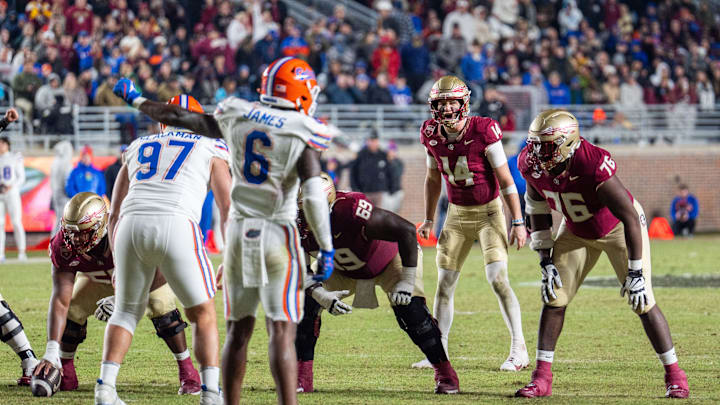TV ratings for Florida Football were outstanding in 2024. Despite a 7-5 record, the Gators wound up among the ten most-watched teams in the country, with an average of 4.3 million people watching per game.
But while TV ratings for Florida and college football as a whole are doing great, the news has not been as good for the NBA, which has had a notable ratings drop in 2024.
It may seem weird to compare the Gators to the NBA, but there are lessons to be learned if Florida and college football wants to keep attracting eyeballs.
Beyond the tired tropes of politics, here are three very real lessons Florida needs to keep in mind moving forward.
Keep games accessible to the public
One of the very real problems the NBA is having right now is that fans in local markets have minimal ability to watch games without shelling out extra money.
In Florida, for example, both the Miami Heat and the Orlando Magic are locked behind the FanDuel Sports Network, which is essentially only carried by Spectrum.
All the streaming services like YouTube TV, Hulu Live, or Sling have had the regional sports networks drop off over the years.
The end result is that fans become disconnected from teams when they have to jump through hoops or pay extra money just to watch them.
For now, almost every Florida game is available through ESPN/ABC. However, ESPN has experimented with putting games against FCS opponents on ESPN+, which requires an extra subscription. Combined with YouTube TV upping their price another $10, there are some warning signs looming ahead as to how college football might try to make their product more difficult to access.
Star players need to play when healthy
College football has always been built more on the logo than it has on star power, but another very real problem facing the NBA has been the idea of load management.
Fans buy tickets when certain teams come to town with the idea of seeing a star player on that team, only for that star to sit out due to "load management." The same goes for whether or not someone is going to keep a particular game on TV or change the channel.
Florida hasn't had to deal with load management yet, but one reason bowl games have been relegated to glorified exhibitions is because of players around the country opting out left and right.
If it stays to the bowl games, it is what it is. But that sport needs to make sure doesn't happen is players start opting out before that. There have been a handful of cases around the country where NIL disputes have led to players leaving midseason.
What we don't want it evolving to is players pulling the "I'm not playing unless you up my NIL" card.
Keep the product interesting
Above all else, beyond the politics and inability to watch games, the NBA is just a dull league right now. Analytics have driven the game to the point where each game has turned into a glorified three-point shooting contest.
Consider it this way: in the 2007/08 season, Golden State led the league in three-point attempts per game with 26.6. This season, Denver is dead last in the NBA with 30.5 three-point attempts per game.
Coaches will defend it and say they are just trying to win a game, but at some point, the league has to remember that in order to make money, it has to be a game people care about whether or not you win.
College football has tried to keep a tab on this idea and has been implementing some rule changes to keep the clock moving. What concerns fans is that the TV networks, at times, take advantage of that and use it to cram more commercials.
And while analytics in football seems mostly relegated to fourth-down choices, what fans don't want is a game driven solely by the optimization of winning that sucks any enjoyment of that win out of the air.
